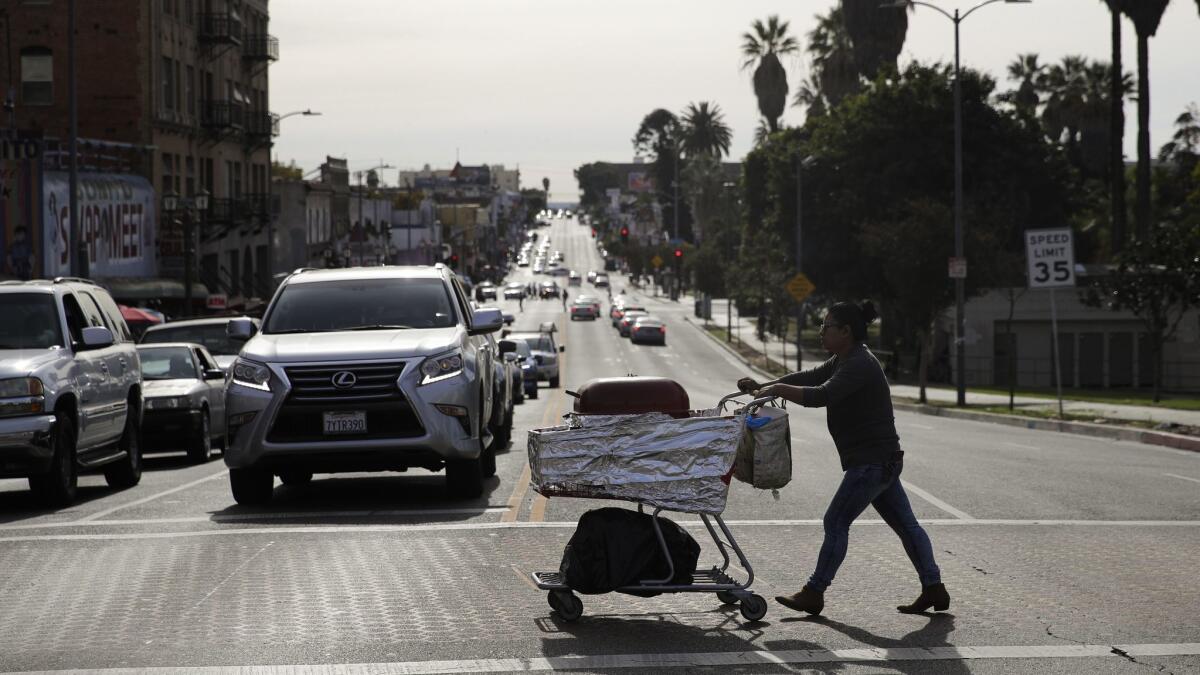Huntington Beach plans to temporarily allow street vending, albeit with heavy restrictions

- Share via
Huntington Beach may lift its prohibition on street vendors and then establish a temporary permitting process in order to comply with state law.
Senate Bill 946 legalized street vending statewide Jan. 1. The law strips criminal penalties associated with vending and gives the state overriding control of the typically independent enterprises. The law also requires local governments to adopt regulations that conform to the state framework.
The Huntington Beach City Council on Tuesday will consider adopting an emergency ordinance that creates a temporary permit program for 120 days while city staff brainstorm recommendations for a permanent sidewalk vendor ordinance. Newport Beach approved similar regulations in November.
Under Huntington’s emergency ordinance, street vendors will be required to apply annually for a permit and a business license, which must be displayed at all times. Permits would be non-transferable.
Some vendors also require a state food-vending licenses.
The pending ordinance restricts vendors from doing business in residential zones, at the beach and in nearby areas, such as Pier Plaza, downtown, parks, City Hall and along Pacific Coast Highway inside city limits.
It’s unclear where vendors would be able to do business in compliance with the restrictions.
Offenders face $100 fines for the first violation and $200 for the second within the same year. Fines increase to $500 for each additional violation within a year of the first.
City Atty. Michael Gates described the emergency ordinance as striking a balance between promoting small business and maintaining public health, safety and welfare, according to the staff report.
H.B. takes steps to produce local programming
In other business, the council will consider giving six-month notice to a cable company so the city can begin to create its own local television programming.
The proposal comes after city officials outlined a $425,000 business plan for the first year of “Surf City 3” in December.
The Public Cable Television Authority currently provides local programming for Huntington Beach, Fountain Valley, Stanton and Westminster. Surf City funds 67% — $755,615 — of the 2018-19 budget. The other three cities collectively contribute 33%, or $356,257.
If Huntington exits the PCTA, the city manager’s office would oversee cable operations while the Communications Committee would discuss and review programming, which may feature local music, council members, high school sports and exercise classes.
Proposed commission may review city’s charter
The council will also consider a proposal by Councilman Mike Posey to create a 15-member commission to examine the city charter, which requires review every 10 years.
Posey suggests that seven members should be appointed individually by each council member to the charter commission and that the remaining eight be selected by the council as a whole.
Tuesday’s council meeting begins at 6 p.m. in the Civic Center, 2000 Main St.
All the latest on Orange County from Orange County.
Get our free TimesOC newsletter.
You may occasionally receive promotional content from the Daily Pilot.




